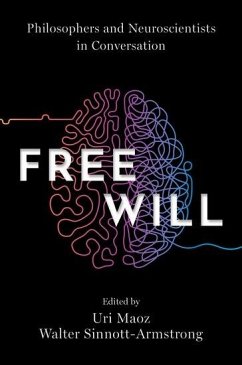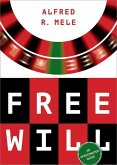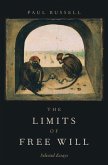Free Will
Philosophers and Neuroscientists in Conversation
Herausgeber: Maoz, Uri; Sinnott-Armstrong, Walter
Free Will
Philosophers and Neuroscientists in Conversation
Herausgeber: Maoz, Uri; Sinnott-Armstrong, Walter
- Broschiertes Buch
- Merkliste
- Auf die Merkliste
- Bewerten Bewerten
- Teilen
- Produkt teilen
- Produkterinnerung
- Produkterinnerung
This book contains thirty bidirectional exchanges between neuroscientists and philosophers that focus on the most critical questions in the neurophilosophy of free will. It mimics a lively, interdisciplinary conference, where experts answer questions and follow-up questions from the other field, helping each discipline to understand how the other thinks and works. Each chapter is concise and accessible to non-experts-free from disciplinary jargon and highly technical details-but also employs thorough and up-to-date research from experts in the field.
Andere Kunden interessierten sich auch für
![Free Will Free Will]() Alfred R. Mele (William H. and Lucyle T. Werkmeister Professor of PFree Will30,99 €
Alfred R. Mele (William H. and Lucyle T. Werkmeister Professor of PFree Will30,99 €![The Limits of Free Will The Limits of Free Will]() Paul Russell (Professor in Philosophy, Professor in Philosophy, UniThe Limits of Free Will131,99 €
Paul Russell (Professor in Philosophy, Professor in Philosophy, UniThe Limits of Free Will131,99 €![Mind, Quantum, and Free Will Mind, Quantum, and Free Will]() Peter EllsMind, Quantum, and Free Will25,99 €
Peter EllsMind, Quantum, and Free Will25,99 €![Free Will Free Will]() Thomas Pink (, Lecturer in Philosophy, King's College, University oFree Will17,99 €
Thomas Pink (, Lecturer in Philosophy, King's College, University oFree Will17,99 €![Free Will and Theism Free Will and Theism]() Free Will and Theism115,99 €
Free Will and Theism115,99 €![Free Will and the Rebel Angels in Medieval Philosophy Free Will and the Rebel Angels in Medieval Philosophy]() Tobias Hoffmann (Washington DC The Catholic University of America)Free Will and the Rebel Angels in Medieval Philosophy114,99 €
Tobias Hoffmann (Washington DC The Catholic University of America)Free Will and the Rebel Angels in Medieval Philosophy114,99 €![Distributed Cognition and the Will Distributed Cognition and the Will]() Don Ross / David Spurrett / Harold Kincaid / G. Lynn Stephens (eds.)Distributed Cognition and the Will11,99 €
Don Ross / David Spurrett / Harold Kincaid / G. Lynn Stephens (eds.)Distributed Cognition and the Will11,99 €-
-
-
This book contains thirty bidirectional exchanges between neuroscientists and philosophers that focus on the most critical questions in the neurophilosophy of free will. It mimics a lively, interdisciplinary conference, where experts answer questions and follow-up questions from the other field, helping each discipline to understand how the other thinks and works. Each chapter is concise and accessible to non-experts-free from disciplinary jargon and highly technical details-but also employs thorough and up-to-date research from experts in the field.
Hinweis: Dieser Artikel kann nur an eine deutsche Lieferadresse ausgeliefert werden.
Hinweis: Dieser Artikel kann nur an eine deutsche Lieferadresse ausgeliefert werden.
Produktdetails
- Produktdetails
- Verlag: Oxford University Press Inc
- Seitenzahl: 344
- Erscheinungstermin: 25. Januar 2022
- Englisch
- Abmessung: 206mm x 136mm x 23mm
- Gewicht: 394g
- ISBN-13: 9780197572160
- ISBN-10: 0197572162
- Artikelnr.: 62191207
- Herstellerkennzeichnung
- Libri GmbH
- Europaallee 1
- 36244 Bad Hersfeld
- gpsr@libri.de
- Verlag: Oxford University Press Inc
- Seitenzahl: 344
- Erscheinungstermin: 25. Januar 2022
- Englisch
- Abmessung: 206mm x 136mm x 23mm
- Gewicht: 394g
- ISBN-13: 9780197572160
- ISBN-10: 0197572162
- Artikelnr.: 62191207
- Herstellerkennzeichnung
- Libri GmbH
- Europaallee 1
- 36244 Bad Hersfeld
- gpsr@libri.de
Walter Sinnott-Armstrong is Chauncey Stillman Professor of Practical Ethics in the Department of Philosophy and the Kenan Institute for Ethics at Duke University. He holds secondary appointments in Duke's Law School and Department of Psychology and Neuroscience. He is a Partner Investigator at the Oxford Uehiro Centre for Neuroethics and a Research Scientist with the Mind Research Network in New Mexico. He has served as co-chair of the Board of Officers of the American Philosophical Association and co-director of the MacArthur Law and Neuroscience Project. He earned his bachelor's degree from Amherst College and his doctorate from Yale University. He has published widely, but his current work focuses on moral artificial intelligence, free will and moral responsibility, and various topics in moral psychology and brain science. His most recent books with Oxford University Press are Think Again: How to Reason and Argue, and Clean Hands: Philosophical Lessons from Scrupulosity. He co-directs Summer Seminars in Neuroscience and Philosophy and co-teaches a MOOC, Think Again, with over 1,000,000 registered students. Uri Maoz is a computational neuroscientist, who researches volition, decision-making, and moral choice. He joined Chapman University in 2017 as an Assistant Professor of Computational Neuroscience and Psychology at Crean College and at the Institute for Interdisciplinary Brain and Behavioral Sciences, where he uses combination of empirical techniques (e.g., EEG, intracranial recordings, behavioral studies) and modeling to develop a computational account of volition, with an emphasis on the decision-making processes that lead to voluntary action and on the role of consciousness in such processes. In particular, he uses machine-learning to carry out online, real-time, closed-loop analysis of neural data, as it is being recorded. He is further interested in the legal, ethical, and philosophical implications of this work.
* Preface
* I. Questions from Neuroscientists for Philosophers
* 1. What is an intention? - Gideon Yaffe
* 2. What is a will? - Pamela Hieronymi
* 3. When is an action voluntary? - Pamela Hieronymi
* 4. What is freedom? - Walter Sinnott-Armstrong
* 5. What is free will? - Timothy O'Connor
* 6. Can there be free will in a determined universe? - Timothy
O'Connor
* 7. Does free will come in degrees? - Jonathan Hall and Tillmann
Vierkant
* 8. How can we determine whether or not we have free will? - Alfred R.
Mele
* 9. What kind of neuroscientific evidence, if any, could determine
whether anyone has free will? - Adina L. Roskies
* 10. What kind of behavioral experiments, if any could determine
whether anyone has free will? - Tim Bayne
* 11. Can a robot with artificial intelligence have free will? -
Jonathan Hall and Tillmann Vierkant
* 12. Do conscious decisions cause physical actions? - Ned Block
* 13. How is consciousness related to freedom of action or will? - Tim
Bayne
* 14. How is responsibility related to free will, control, and action?
- Gideon Yaffe
* 15. What are reasons? - Walter Sinnott-Armstrong
* II. Questions from Philosophers for Neuroscientists
* 16. What are the main stages in the neural processes that produce
actions? - Patrick Haggard and Elisabeth Parés-Pujolràs
* 17. Does the will correspond to any clearly delineated brain area or
activity? - Gabriel Kreiman
* 18. How are the neural processes for deciding when to move similar
and different from those for deciding what or how to move? - Antonio
Ivano Triggiani and Mark Hallett
* 19. How are arbitrary and deliberate decisions similar and different?
- Jye Bold, Liad Mudrik, and Uri Maoz
* 20. How do higher-level brain areas exert control over lower-level
brain areas? - Mark Hallett
* 21. What are intentional actions? - Elisabeth Parés-Pujolràs and
Patrick Haggard
* 22. What evidence is there that intentions are represented in the
brain? - John-Dylan Haynes
* 23. What is known about the neural correlates of specific beliefs and
desires that inform human choices? - Amber Hopkins and Uri Maoz
* 24. How can we determine whether or not an agent is conscious of a
bit of information relevant to an action? - Liad Mudrik and Aaron
Schurger
* 25. Which neural mechanisms could enable conscious control of action?
- Jake Gavenas, Mark Hallett, and Uri Maoz
* 26. How does the absence of a consensus about the neural basis of
consciousness and volition affect theorizing about conscious
volition? - Amber Hopkins, Liad Mudrik, and Uri Maoz
* 27. How can we determine the precise timing of brain events related
to action? - Mark Hallett and Aaron Schurger
* 28. How can we determine the precise timing of mental events related
to action? - Sae Jin Lee, Sook Mun (Alice) Wong, Uri Maoz, and Mark
Hallett
* 29. Are any neural processes truly random (or stochastic)? - Hans
Liljenström
* 30. How can computational models help us understand free will? -
Gabriel Kreiman, Hans Liljenström, Aaron Schurger, and Uri Maoz
* Brain Maps - Amber Hopkins and Natalie Nichols
* Glossary - Claire Simmons and Amber Hopkins
* Annotated Bibliography - Deniz Ar?türk and Amber Hopkins
* I. Questions from Neuroscientists for Philosophers
* 1. What is an intention? - Gideon Yaffe
* 2. What is a will? - Pamela Hieronymi
* 3. When is an action voluntary? - Pamela Hieronymi
* 4. What is freedom? - Walter Sinnott-Armstrong
* 5. What is free will? - Timothy O'Connor
* 6. Can there be free will in a determined universe? - Timothy
O'Connor
* 7. Does free will come in degrees? - Jonathan Hall and Tillmann
Vierkant
* 8. How can we determine whether or not we have free will? - Alfred R.
Mele
* 9. What kind of neuroscientific evidence, if any, could determine
whether anyone has free will? - Adina L. Roskies
* 10. What kind of behavioral experiments, if any could determine
whether anyone has free will? - Tim Bayne
* 11. Can a robot with artificial intelligence have free will? -
Jonathan Hall and Tillmann Vierkant
* 12. Do conscious decisions cause physical actions? - Ned Block
* 13. How is consciousness related to freedom of action or will? - Tim
Bayne
* 14. How is responsibility related to free will, control, and action?
- Gideon Yaffe
* 15. What are reasons? - Walter Sinnott-Armstrong
* II. Questions from Philosophers for Neuroscientists
* 16. What are the main stages in the neural processes that produce
actions? - Patrick Haggard and Elisabeth Parés-Pujolràs
* 17. Does the will correspond to any clearly delineated brain area or
activity? - Gabriel Kreiman
* 18. How are the neural processes for deciding when to move similar
and different from those for deciding what or how to move? - Antonio
Ivano Triggiani and Mark Hallett
* 19. How are arbitrary and deliberate decisions similar and different?
- Jye Bold, Liad Mudrik, and Uri Maoz
* 20. How do higher-level brain areas exert control over lower-level
brain areas? - Mark Hallett
* 21. What are intentional actions? - Elisabeth Parés-Pujolràs and
Patrick Haggard
* 22. What evidence is there that intentions are represented in the
brain? - John-Dylan Haynes
* 23. What is known about the neural correlates of specific beliefs and
desires that inform human choices? - Amber Hopkins and Uri Maoz
* 24. How can we determine whether or not an agent is conscious of a
bit of information relevant to an action? - Liad Mudrik and Aaron
Schurger
* 25. Which neural mechanisms could enable conscious control of action?
- Jake Gavenas, Mark Hallett, and Uri Maoz
* 26. How does the absence of a consensus about the neural basis of
consciousness and volition affect theorizing about conscious
volition? - Amber Hopkins, Liad Mudrik, and Uri Maoz
* 27. How can we determine the precise timing of brain events related
to action? - Mark Hallett and Aaron Schurger
* 28. How can we determine the precise timing of mental events related
to action? - Sae Jin Lee, Sook Mun (Alice) Wong, Uri Maoz, and Mark
Hallett
* 29. Are any neural processes truly random (or stochastic)? - Hans
Liljenström
* 30. How can computational models help us understand free will? -
Gabriel Kreiman, Hans Liljenström, Aaron Schurger, and Uri Maoz
* Brain Maps - Amber Hopkins and Natalie Nichols
* Glossary - Claire Simmons and Amber Hopkins
* Annotated Bibliography - Deniz Ar?türk and Amber Hopkins
* Preface
* I. Questions from Neuroscientists for Philosophers
* 1. What is an intention? - Gideon Yaffe
* 2. What is a will? - Pamela Hieronymi
* 3. When is an action voluntary? - Pamela Hieronymi
* 4. What is freedom? - Walter Sinnott-Armstrong
* 5. What is free will? - Timothy O'Connor
* 6. Can there be free will in a determined universe? - Timothy
O'Connor
* 7. Does free will come in degrees? - Jonathan Hall and Tillmann
Vierkant
* 8. How can we determine whether or not we have free will? - Alfred R.
Mele
* 9. What kind of neuroscientific evidence, if any, could determine
whether anyone has free will? - Adina L. Roskies
* 10. What kind of behavioral experiments, if any could determine
whether anyone has free will? - Tim Bayne
* 11. Can a robot with artificial intelligence have free will? -
Jonathan Hall and Tillmann Vierkant
* 12. Do conscious decisions cause physical actions? - Ned Block
* 13. How is consciousness related to freedom of action or will? - Tim
Bayne
* 14. How is responsibility related to free will, control, and action?
- Gideon Yaffe
* 15. What are reasons? - Walter Sinnott-Armstrong
* II. Questions from Philosophers for Neuroscientists
* 16. What are the main stages in the neural processes that produce
actions? - Patrick Haggard and Elisabeth Parés-Pujolràs
* 17. Does the will correspond to any clearly delineated brain area or
activity? - Gabriel Kreiman
* 18. How are the neural processes for deciding when to move similar
and different from those for deciding what or how to move? - Antonio
Ivano Triggiani and Mark Hallett
* 19. How are arbitrary and deliberate decisions similar and different?
- Jye Bold, Liad Mudrik, and Uri Maoz
* 20. How do higher-level brain areas exert control over lower-level
brain areas? - Mark Hallett
* 21. What are intentional actions? - Elisabeth Parés-Pujolràs and
Patrick Haggard
* 22. What evidence is there that intentions are represented in the
brain? - John-Dylan Haynes
* 23. What is known about the neural correlates of specific beliefs and
desires that inform human choices? - Amber Hopkins and Uri Maoz
* 24. How can we determine whether or not an agent is conscious of a
bit of information relevant to an action? - Liad Mudrik and Aaron
Schurger
* 25. Which neural mechanisms could enable conscious control of action?
- Jake Gavenas, Mark Hallett, and Uri Maoz
* 26. How does the absence of a consensus about the neural basis of
consciousness and volition affect theorizing about conscious
volition? - Amber Hopkins, Liad Mudrik, and Uri Maoz
* 27. How can we determine the precise timing of brain events related
to action? - Mark Hallett and Aaron Schurger
* 28. How can we determine the precise timing of mental events related
to action? - Sae Jin Lee, Sook Mun (Alice) Wong, Uri Maoz, and Mark
Hallett
* 29. Are any neural processes truly random (or stochastic)? - Hans
Liljenström
* 30. How can computational models help us understand free will? -
Gabriel Kreiman, Hans Liljenström, Aaron Schurger, and Uri Maoz
* Brain Maps - Amber Hopkins and Natalie Nichols
* Glossary - Claire Simmons and Amber Hopkins
* Annotated Bibliography - Deniz Ar?türk and Amber Hopkins
* I. Questions from Neuroscientists for Philosophers
* 1. What is an intention? - Gideon Yaffe
* 2. What is a will? - Pamela Hieronymi
* 3. When is an action voluntary? - Pamela Hieronymi
* 4. What is freedom? - Walter Sinnott-Armstrong
* 5. What is free will? - Timothy O'Connor
* 6. Can there be free will in a determined universe? - Timothy
O'Connor
* 7. Does free will come in degrees? - Jonathan Hall and Tillmann
Vierkant
* 8. How can we determine whether or not we have free will? - Alfred R.
Mele
* 9. What kind of neuroscientific evidence, if any, could determine
whether anyone has free will? - Adina L. Roskies
* 10. What kind of behavioral experiments, if any could determine
whether anyone has free will? - Tim Bayne
* 11. Can a robot with artificial intelligence have free will? -
Jonathan Hall and Tillmann Vierkant
* 12. Do conscious decisions cause physical actions? - Ned Block
* 13. How is consciousness related to freedom of action or will? - Tim
Bayne
* 14. How is responsibility related to free will, control, and action?
- Gideon Yaffe
* 15. What are reasons? - Walter Sinnott-Armstrong
* II. Questions from Philosophers for Neuroscientists
* 16. What are the main stages in the neural processes that produce
actions? - Patrick Haggard and Elisabeth Parés-Pujolràs
* 17. Does the will correspond to any clearly delineated brain area or
activity? - Gabriel Kreiman
* 18. How are the neural processes for deciding when to move similar
and different from those for deciding what or how to move? - Antonio
Ivano Triggiani and Mark Hallett
* 19. How are arbitrary and deliberate decisions similar and different?
- Jye Bold, Liad Mudrik, and Uri Maoz
* 20. How do higher-level brain areas exert control over lower-level
brain areas? - Mark Hallett
* 21. What are intentional actions? - Elisabeth Parés-Pujolràs and
Patrick Haggard
* 22. What evidence is there that intentions are represented in the
brain? - John-Dylan Haynes
* 23. What is known about the neural correlates of specific beliefs and
desires that inform human choices? - Amber Hopkins and Uri Maoz
* 24. How can we determine whether or not an agent is conscious of a
bit of information relevant to an action? - Liad Mudrik and Aaron
Schurger
* 25. Which neural mechanisms could enable conscious control of action?
- Jake Gavenas, Mark Hallett, and Uri Maoz
* 26. How does the absence of a consensus about the neural basis of
consciousness and volition affect theorizing about conscious
volition? - Amber Hopkins, Liad Mudrik, and Uri Maoz
* 27. How can we determine the precise timing of brain events related
to action? - Mark Hallett and Aaron Schurger
* 28. How can we determine the precise timing of mental events related
to action? - Sae Jin Lee, Sook Mun (Alice) Wong, Uri Maoz, and Mark
Hallett
* 29. Are any neural processes truly random (or stochastic)? - Hans
Liljenström
* 30. How can computational models help us understand free will? -
Gabriel Kreiman, Hans Liljenström, Aaron Schurger, and Uri Maoz
* Brain Maps - Amber Hopkins and Natalie Nichols
* Glossary - Claire Simmons and Amber Hopkins
* Annotated Bibliography - Deniz Ar?türk and Amber Hopkins








